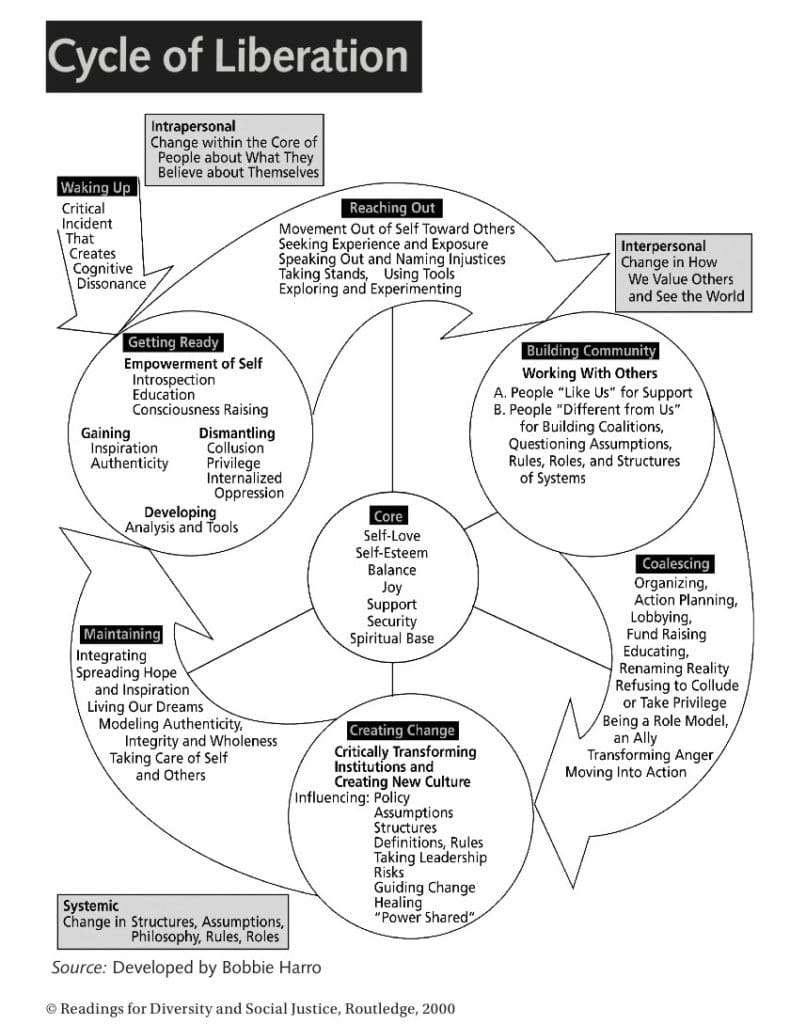We’ve been writing a lot about seeing each other’s humanity —the full, unique individual made up of many identity markers and experiences. In Bobbie Harro’s Cycle of Liberation, this is part of the Waking Up and Getting Ready stages.

You can see from Harro’s graphic above that we can’t get to Creating Change alone. It’s essential that we move beyond the self in Reaching Out and work with others in Building Community.
But reaching out and building community are actions.
We just don’t see them that way. Our bias toward action depends on the limited definition of “action” as tasks, deliverables, and performances. But here are some very concrete actions required to transform an organization’s culture:
Showing up authentically.
Sharing our experiences and perspectives with others.
Listening deeply.
Holding space for each other’s differences.
Managing our discomfort.
Sharing our disagreement with respect.
Asking for what we need.
Engaging in productive conflict.
None of this sounds like the kind of action valued by toxic productivity culture. These acts of connection can’t be measured in KPIs. They can’t be assessed on a point scale. They can’t be equated with dollars.
“We spent too much time sharing,” was a piece of feedback we received after one organization’s values excavation session. We had spent the first portion of a meeting on introductions and asking participants to all describe their learning styles. “It took too long to get to the real conversation.”
Part of our job is to reframe what DEI work actually involves. Getting to know everyone on the team and understanding each person’s learning style wasn’t just a prelude to the real work, and it wasn’t just an icebreaker or a nicety. Sharing is part of the real conversation. Finding out how someone sees themselves is the real conversation.
Because knowing who you’re working with is a crucial part of doing the work. It’s sometimes the hardest and longest part. There’s no avoiding or expediting the process of building community.
Often, we think that understanding each other is an intellectual exercise. Take the recent comments by General Mark A. Milley, Chairman of the Joint Chiefs of Staff. While we were heartened to hear that he recently defended the Critical Race Theory curriculum in the U.S. Military Academy, reading about different perspectives isn’t enough. Equity and inclusion are not concepts. They are a series of daily choices we make and values we uphold, alongside people whom we see and know.
We Are All Bridges
A mentor once told Aubrey that as a Black woman, she would be seen as a bridge between different groups. “But remember,” he also warned, “bridges get walked on.” The metaphor has stuck with her ever since.
Connection means that we carry others and that we are carried.
Relationship means we extend bridges and invite others into our space with openness and vulnerability.
Community means, in the words of Elena Aguilar, we build a bridge between our current reality and our ideal reality.
Together, we travel the very road we are co-creating. All the while, it’s important to remember that we all wield power differently. Leaders need to carry more. They need to extend their bridges first. They need to model vulnerability.
Opportunity is Other People
Everything we need to thrive—creativity, growth, support, innovation—comes through relationships. The myth of individualism, which is a value of white supremacy culture, would have us believe we own our achievements alone, and that we should and must work alone. We think we have no bridges to offer. We have no idea how to begin building a path toward each other.
One reason DEI work can feel so challenging is that we’re slowly unlearning this myth about our identity. Needing others feels threatening only if you’ve been taught all your life that you act alone. Asking for help feels weak and sharing about yourself feels like a waste of time only if you were socialized to believe you don’t need others to succeed.
But here is the truth: the risk of depending on each other is the only way forward.
Once we see the truth about our connection, it’s easy to see relationships at the center of all DEI work.
We share and listen.
We build emotional awareness.
We identify and manage our defense mechanisms.
We invite, tolerate, and move through discomfort.
We understand power dynamics.
We uncover our stated and unstated values.
We scrutinize our behaviors that don’t align with our values.
We change and grow.
We embrace mistakes.
We create belonging.
We belong.
The interpersonal isn’t extra stuff. The interpersonal is The Work.
If your organization is ready to get to work in transforming your culture, contact anyone on our team today.
